- Home
- Harlan Ellison
The Kyben Stories
The Kyben Stories Read online
CONTENTS
Whispers from the Telling Box
Night and the Enemy
LIFE HUTCH
THE CRACKPOTS
TROJAN HEARSE
THE UNTOUCHABLE ADOLESCENTS
DEEPER THAN THE DARKNESS
RUN FOR THE STARS
THE HUMAN OPERATORS
SLEEPING DOGS
THE PROUD, THE FEW
Night and the Enemy
The Kyben Stories
First Appearances
Whispers from the Telling Box
In thirty-five years as a writer, I have never written a sequel to one of my stories. I hate sequels. Nothing in the current publishing fashion saddens me more than the seemingly endless tsunami of sequels, trilogies, dekalogies and "shared universe" novels that has deluged the bookstalls these past half dozen years.
It's not difficult to understand why they sell: it's the same reason anthology shows on television draw a tiny audience, while dynastic primetime soap operas command huge ratings. The casual reader — or viewer — seeks familiarity, a comfortable sense of knowing what's going on, as you're going in. But that same need for comfortability contains the seed of rot that finally cancels all tv shows and eventually drives all but the most plebeian readers from a writer's work. Familiarity does, indeed, breed boredom . . . if not contempt.
Hell, even Tolstoi was able to do War and Peace in one volume; and though Proust's extraordinary lifework takes seven books in The Modern Library to tell the Guermantes' saga, it was as a single unbroken narrative that Remembrance of Things Past was conceived. And I think it hubris of an unconscionable sort for the authors of fantasy trilogies to validate their windy, bloated effusions by recourse to Tolstoi or Proust. If a story is worth telling, and it's told well. . . one book ought to suffice. What follow are almost always second-thoughts, rechewed spinach, shadowy five-finger exercises.
An affection for concision and telling a tale with a punch is probably why I've spent most of my career time in lengths of fiction shorter than the novel. And once having dealt with a subject and its characters, I feel I've said what had to be said. I've never wanted to go back and write another story about the Harlequin and the Ticktockman, or examine what befell that guy who had no mouth, but needed to scream.
Only twice have I ever released work that bore linkage with previous writings. The first is the periodic publication of sections of a long novel called Blood's a Rover, one part of which you may know as "A Boy and His Dog." But it was only by chance that "A Boy and His Dog" became so popular, and became a film. And that novella is merely a small section of the full work which — if the reaper don't cut me down — I'll get around to finishing sometime pretty soon.
The second instance involves the Earth-Kyba War stories that make up Night and the Enemy. Though I have written a new framing device for the five tales in this book, tying them together in a simulacrum of a "future history," they are not, in truth, linked by anything except the background of The War.
It was convenient, when I first became a professional writer, to use such a device. But it was never intended as anything more potent than a framework. An Orient Express, on which Agatha Christie could locate a murder. An intergalactic Ship of Fools against which I could examine the human stories (and alien stories) that interested me.
Now Ken Steacy has illustrated those five stories of The War, and done them so well that it may pique my interest in writing other, untold stories set against the backdrop of Earth's two hundred-year-long conflict with the golden Kyben. Those stories exist here, in my head (though I've discovered three or four more yarns not presented here, published years ago, in which the Kyben are mentioned or have minor walk-ons), and the Kyben are, of course, the villains of Demon With a Glass Hand. They are also — and you're getting the word here first — a major element of the two-hour television film I recently completed for Roger Corman and NBC. The movie is called Cutter's World, and if it does well, they tell me it will become a regular series.
Which may mean The Telling Box will speak again.
Harlan Ellison
September 1987
Night and the Enemy
They are lords and owners of their universe. As far as the photon can be flung, from the Coalsack to the Hub, from the Melting Ridge to Fornax, Cetus and Sculptor . . . they are all that abides of intelligent life. Once there were two species that sailed on the star-winds. . . humans birthed in the steaming ooze of the planet Earth . . . and the humanoid, but not human, Kyben whose home. world Kyba came to be the spawning ground of alien ambition.
And they met, and they fought. It should never have been; there was vastness and solitude for all, worlds beyond worlds that neither could have settled in twice ten billion years. But for each race there had been thousands of years of ethnocentricity, uncounted centuries of ego and rapacity, during which time nothing stood against them. And each race came to think it was The Noblest Experiment, masters of the cosmic ephemeris, rulers of the far starfields. So when they met, they bared their fangs . . . and went to War.
For two hundred years they laid waste to everything around them. And in the end, one destroyed the other. But which the vanquisher, and which the vanquished?
Now, five million years after the last battle between Earth and Kyba, on the world once known as Epsilon lndi IV, the descendants of those born to Earth . . or Kyba . . have returned to the battlefield.
No longer human or humanoid, but so advanced they have done away with starships and inverspace teleportation and even their fleshy bodies, they return as motes of sentient light. On beams of luminescence that are elements of their own being.
A short time ago (as time is measured in the infinite eye) they found what was left of the Earth. In the ruins they found the Telling Boxes. One of the Telling Boxes held memories of the War, the Great Long War. Neither complete history nor studied explanation of how that War had come to be, the Telling Boxes contained random entries, snippets of life that transpired during those endless days.
As they spin webs between the suns, they absorb those moments of life lost by Kyban and Human: to ready themselves for the great discovery. On the last world of the final days of the War, they will translate back to their original forms. The only artifact they have retained from those former times, the transmat, will not function. It has always held the silent secret of their origin, but not even their power was sufficient to permit devolution. The Telling Box has provided the key. On Epsilon Indi IV they will find a power source that will activate the transmat. They will, at last, recover the truth of the myths about their origin. Which were the ancestors of these godlike burning lights? Humans or Kyben?
LIFE HUTCH
Terrence slid his right hand, the one out of sight of the robot, up his side. The razoring pain of the three broken ribs caused his eyes to widen momentarily in pain. Then he recovered himself and closed them till he was studying the machine through narrow slits.
If the eyeballs click, I’m dead, thought Terrence.
The intricate murmurings of the life hutch around him brought back the immediacy of his situation. His eyes again fastened on the medicine cabinet clamped to the wall next to the robot’s duty-niche.
Cliche. So near yet so far. It could be all the way back on Antares-Base for all the good it’s doing me, he thought, and a crazy laugh rang through his head. He caught himself just in time. Easy! Three days is a nightmare, but cracking up will only make it end sooner. That was the last thing he wanted. But it couldn’t go on much longer.
He flexed the fingers of his right hand. It was all he could move. Silently he damned the technician who had passed the robot through. Or the politician who had let inferior robots get placed in the life hutches so he could get a rake-off from
the government contract. Or the repairman who hadn’t bothered checking closely his last time around. All of them; he damned them all.
They deserved it.
He was dying.
His death had started before he had reached the life hutch. Terrence had begun to die when he had gone into the battle.
He let his eyes close completely, let the sounds of the life hutch fade from around him. Slowly, the sound of the coolants hush-hushing through the wall-pipes, the relay machines feeding their messages without pause from all over the galaxy, the whirr of the antenna’s standard turning in its socket atop the bubble, slowly they melted into silence. He had resorted to blocking himself off from reality many times during the past three days. It was either that or existing with the robot watching, and eventually he would have had to move. To move was to die. It was that simple.
He closed his ears to the whisperings of the life hutch; he listened to the whisperings within himself.
“Good God! There must be a million of them!”
It was the voice of the squadron leader, Resnick, ringing in his suit intercom.
“What kind of battle formation is that supposed to be?” came another voice. Terrence looked at the radar screen, at the flickering dots signifying Kyben ships.
“Who can tell with those toadstool-shaped ships of theirs,” Resnick answered. “But remember, the whole front umbrella-part is studded with cannon, and it has a helluva range of fire. Okay, watch yourselves, good luck—and give ‘em Hell!”
The fleet dove straight for the Kyben armada.
To his mind came the sounds of war, across the gulf of space. It was all imagination; in that tomb there was no sound. Yet he could clearly detect the hiss of his scout’s blaster as it poured beam after beam into the lead ship of the Kyben fleet.
His sniper-class scout had been near the point of that deadly Terran phalanx, driving like a wedge at the alien ships, converging on them in loose battle-formation. It was then it had happened.
One moment he had been heading into the middle of the battle, the left flank of the giant Kyben dreadnaught turning crimson under the impact of his firepower.
The next moment, he had skittered out of the formation which had slowed to let the Kyben craft overshoot, while the Earthmen decelerated to pick up maneuverability.
He had gone on at the old level and velocity, directly into the forward guns of a toadstool-shaped Kyben destroyer.
The first beam had burned the gun-mounts and directional equipment off the front of the ship, scorching down the aft side in a smear like oxidized chrome plate. He had managed to avoid the second beam.
His radio contact had been brief; he was going to make it back to Antares-Base if he could. If not, the formation would be listening for his homing-beam from a life hutch on whatever planetoid he might find for a crash-landing.
Which was what he had done. The charts had said the pebble spinning there was technically 1-333, 2-A , M & S, 3-804.39#, which would have meant nothing but three-dimensional coordinates had not the small # after the data indicated a life hutch somewhere on its surface.
His distaste for being knocked out of the fighting, being forced onto one of the life hutch planetoids, had been offset only by his fear of running out of fuel before he could locate himself. Of eventually drifting off into space somewhere, to finally wind up as an artificial satellite around some minor sun.
The ship pancaked in under minimal reverse drive, bounced high twice and caromed ten times, tearing out chunks of the rear section, but had come to rest a scant two miles from the life hutch, jammed into the rocks.
Terrence had high-leaped the two miles across the empty, airless planetoid to the hermetically sealed bubble in the rocks. His primary wish was to set the hutch’s beacon signal so his returning fleet could track him.
He had let himself into the decompression chamber, palmed the switch through his thick spacesuit glove, and finally removed his helmet as he heard the air whistle into the chamber.
He had pulled off his gloves, opened the inner door and entered the life hutch itself.
God bless you, little life hutch, Terrence had thought as he dropped the helmet and gloves. He had glanced around, noting the relay machines picking up messages from outside, sorting them, vectoring them off in other directions. He had seen the medicine chest clamped onto the wall, the refrigerator he knew would be well-stocked if a previous tenant hadn’t been there before the stockman could refill it. He had seen the all-purpose robot, immobile in its duty-niche. And the wall chronometer, its face smashed. All of it in a second’s glance.
God bless, too, the gentlemen who thought up the idea of these little rescue stations, stuck all over the place for just such emergencies as this. He had started to walk across the room.
It was at this point that the service robot, that kept the place in repair between tenants and unloaded supplies from the ships, had moved clankingly across the floor, and with one fearful smash of a steel arm thrown Terrence across the room.
The spaceman had been brought up short against the steel bulkhead, pain blossoming in his back, his side, his arms and legs. The machine’s blow had instantly broken three of his ribs. He lay there for a moment, unable to move. For a few seconds he was too stunned to breathe, and it had been that, certainly, that had saved his life. His pain had immobilized him, and in that short space of time the robot had retreated with a muted internal clash of gears.
He had attempted to sit up straight, and the robot had hummed oddly and begun to move. He had stopped the movement. The robot had settled back.
Twice more had convinced him his position was as bad as he had thought.
The robot had worn down somewhere in its printed circuits. Its commands to lift had been erased or distorted so that now it was conditioned to smash, to hit, anything that moved.
He had seen the clock. He realized he should have suspected something was wrong when he saw its smashed face. Of course! The digital dials had moved, the robot had smashed the clock. Terrence had moved, the robot had smashed him.
And would again, if he moved again.
But for the unnoticeable movement of his eyelids, he had not moved in three days.
He had tried moving toward the decompression lock, stopping when the robot advanced and letting it settle back, then moving again, a little nearer. But the idea died with his first movement. His ribs were too painful. The pain was terrible. He was locked in one position, an uncomfortable, twisted position, and he would be there till the stalemate ended, one way or the other.
He was suddenly alert again. The reliving of his last three days brought back reality sharply.
He was twelve feet away from the communications panel, twelve feet away from the beacon that would guide his rescuers to him. Before he died of his wounds, before he starved to death, before the robot crushed him. It could have been twelve light-years, for all the nearer he could get to it.
What had gone wrong with the robot? Time to think was cheap. The robot could detect movement, but thinking was still possible. Not that it could help, but it was possible.
The companies that supplied the life hutch’s needs were all government contracted. Somewhere along the line someone had thrown in impure steel or calibrated the circuit-cutting machines for a less expensive job. Somewhere along the line someone had not run the robot through its paces correctly. Somewhere along the line someone had committed murder.
He opened his eyes again. Only the barest fraction of opening. Any more and the robot would sense the movement of his eyelids. That would be fatal.
He looked at the machine.
It was not, strictly speaking, a robot. It was merely a remote-controlled hunk of jointed steel, invaluable for making beds, stacking steel plating, watching culture dishes, unloading spaceships and sucking dirt from rugs. The robot body, roughly humanoid, but without what would have been a head on a human, was merely an appendage.
The real brain, a complex maze of plastic screens and printed cir
cuits, was behind the wall. It would have been too dangerous to install those delicate parts in a heavy-duty mechanism. It was all too easy for the robot to drop itself from a loading shaft, or be hit by a meteorite, or get caught under a wrecked spaceship. So there were sensitive units in the robot appendage that “saw” and “heard” what was going on, and relayed them to the brain—behind the wall.
And somewhere along the line that brain had worn grooves too deeply into its circuits. It was now mad. Not mad in any way a human being might go mad, for there were an infinite number of ways a machine could go insane. Just mad enough to kill Terrence.
Even if I could hit the robot with something, it wouldn’t stop the thing. He could perhaps throw something at the machine before it could get to him, but it would do no good. The robot brain would still be intact, and the appendage would continue to function. It was hopeless.
He stared at the massive, blocky hands of the robot. It seemed he could see his own blood on the jointed work-tool fingers of one hand. He knew it must be his imagination, but the idea persisted. He flexed the fingers of his hidden hand.
Three days had left him weak and dizzy from hunger. His head was light and his eyes burned steadily. He had been lying in his own filth, till he no longer noticed the discomfort. His side ached and throbbed, and the pain of a blast furnace roared through him every time he breathed.
He thanked God his spacesuit was still on, lest the movement of his breathing bring the robot down on him. There was only one solution, and that solution was his death. He was almost delirious.
Several times during the past day—as well as he could gauge night and day without a clock or a sunrise—he had heard the roar of the fleet landing outside. Then he had realized there was no sound in dead space. Then he had realized they were all inside the relay machines, coming through subspace right into the life hutch. Then he had realized that such a thing was not possible. Then he had come to his senses and realized all that had gone before was hallucination.

 Repent, Harlequin! Said the Ticktockman
Repent, Harlequin! Said the Ticktockman Broken Glass
Broken Glass Other Glass Teat
Other Glass Teat Memos From Purgatory
Memos From Purgatory I Have No Mouth and I Must Scream
I Have No Mouth and I Must Scream The Deadly Streets
The Deadly Streets The Glass Teat
The Glass Teat Paingod and Other Delusions
Paingod and Other Delusions No Doors No Windows
No Doors No Windows Strange Wine
Strange Wine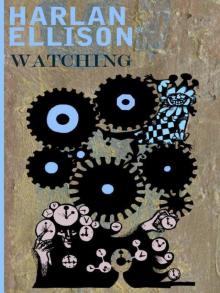 Harlan Ellison's Watching
Harlan Ellison's Watching Over the Edge/An Edge in My Voice
Over the Edge/An Edge in My Voice Troublemakers: Stories by Harlan Ellison
Troublemakers: Stories by Harlan Ellison Gentleman Junkie and Other Stories of the Hung-Up Generation
Gentleman Junkie and Other Stories of the Hung-Up Generation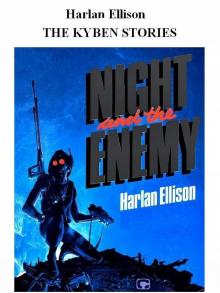 The Kyben Stories
The Kyben Stories From the Land of Fear
From the Land of Fear The Top of the Volcano: The Award-Winning Stories of Harlan Ellison
The Top of the Volcano: The Award-Winning Stories of Harlan Ellison Sleepless Nights in the Procrustean Bed
Sleepless Nights in the Procrustean Bed Ellison Wonderland
Ellison Wonderland Children of the Streets
Children of the Streets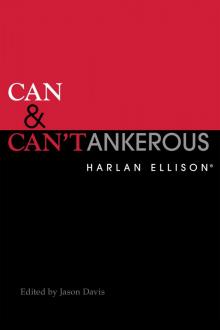 Can & Can'tankerous
Can & Can'tankerous Love Ain't Nothing but Sex Misspelled
Love Ain't Nothing but Sex Misspelled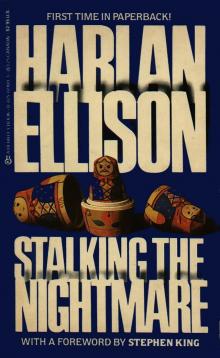 Stalking the Nightmare
Stalking the Nightmare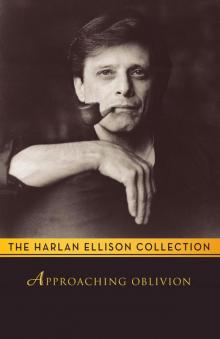 Approaching Oblivion
Approaching Oblivion Deathbird Stories
Deathbird Stories Partners in Wonder
Partners in Wonder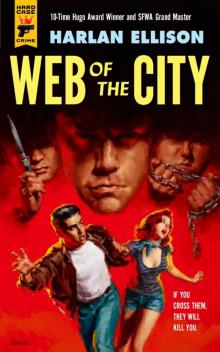 Web of the City
Web of the City Spider Kiss
Spider Kiss A Boy and His Dog
A Boy and His Dog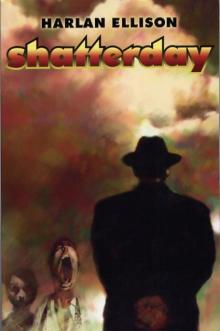 Shatterday
Shatterday Slippage: Previously Uncollected, Precariously Poised Stories
Slippage: Previously Uncollected, Precariously Poised Stories Repent, Harlequin! Said the Ticktockman
Repent, Harlequin! Said the Ticktockman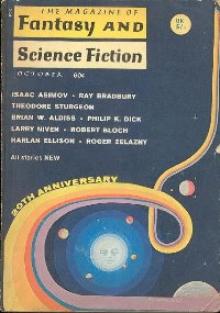 Come to Me Not in Winter's White
Come to Me Not in Winter's White The Song the Zombie Sang
The Song the Zombie Sang The Other Glass Teat
The Other Glass Teat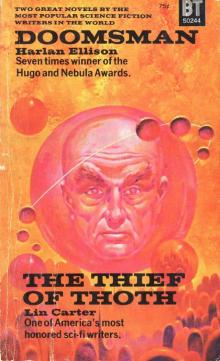 Doomsman - the Theif of Thoth
Doomsman - the Theif of Thoth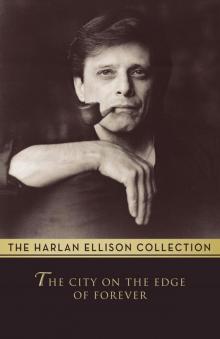 The City on the Edge of Forever
The City on the Edge of Forever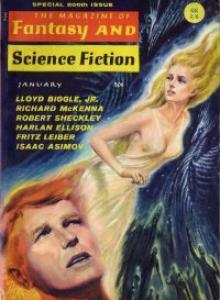 I See a Man Sitting on a Chair, and the Chair Is Biting His Leg
I See a Man Sitting on a Chair, and the Chair Is Biting His Leg The Harlan Ellison Hornbook
The Harlan Ellison Hornbook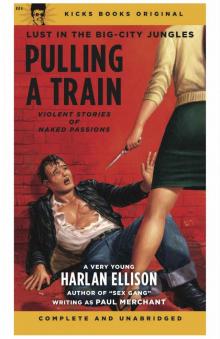 Pulling A Train
Pulling A Train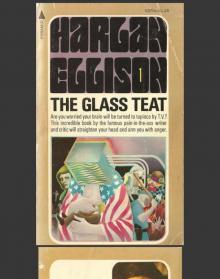 The Glass Teat - essays of opinion on the subject of television
The Glass Teat - essays of opinion on the subject of television An Edge in My Voice
An Edge in My Voice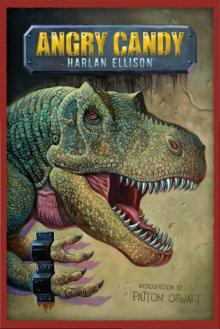 Angry Candy
Angry Candy Troublemakers
Troublemakers The Top of the Volcano
The Top of the Volcano Over the Edge
Over the Edge Survivor #1
Survivor #1 Slippage
Slippage